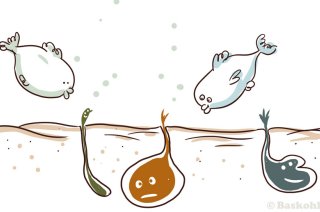
category_news
Does fishing increase food for fish or not?
Fishermen claim that bottom trawling may increase the food for fish, while others claim that bottom trawling may reduce the food availability. So who is right? BENTHIS explored the effect of bottom trawling on the food of fish under a range of conditions using models and field studies. The answer is: both hypotheses are supported.
Under certain conditions trawling will decrease the food for fish, but under other conditions trawling may result in the opposite, for example for benthivorous fish living in sandy sediments. The effect of trawling depended on the importance of top-down or bottom-up processes regulating the benthic community and prey preferences of the fish. A field study carried out in the Skagerrak provided support that the condition of plaice was highest at intermediate trawling intensity. Since indirect effects are most apparent at low fishing intensity, we may expect more and stronger indirect effects in the future in areas where fishing pressure has been reduced.
References
- Kaiser, M. J., Hilborn, R., Jennings, S., Amaroso, R., Andersen, M., Balliet, K., Barratt, E., et al. 2016. Prioritization of knowledge-needs to achieve best practices for bottom trawling in relation to seabed habitats. Fish and Fisheries, 17: 637-663.
- van Denderen, P. D., van Kooten, T., and Rijnsdorp, A. D. 2013. When does fishing lead to more fish? Community consequences of bottom trawl fisheries in demersal food webs. Proceedings of the Royal Society B: Biological Sciences, 280: 20131883.
- Collie, J., Hiddink, J. G., Kooten, T. v., Rijnsdorp, A. D., Kaiser, M. J., Jennings, S., and Hilborn, R. 2016. Indirect effects of bottom fishing on the productivity of marine fish. Fish and Fisheries.
- Hiddink, J. G., Moranta, J., Balestrini, S., Sciberras, M., Cendrier, M., Bowyer, R., Kaiser, M. J., et al. 2016. Bottom trawling affects fish condition through changes in the ratio of prey availability to density of competitors. Journal of Applied Ecology, 53: 1500-1510.
